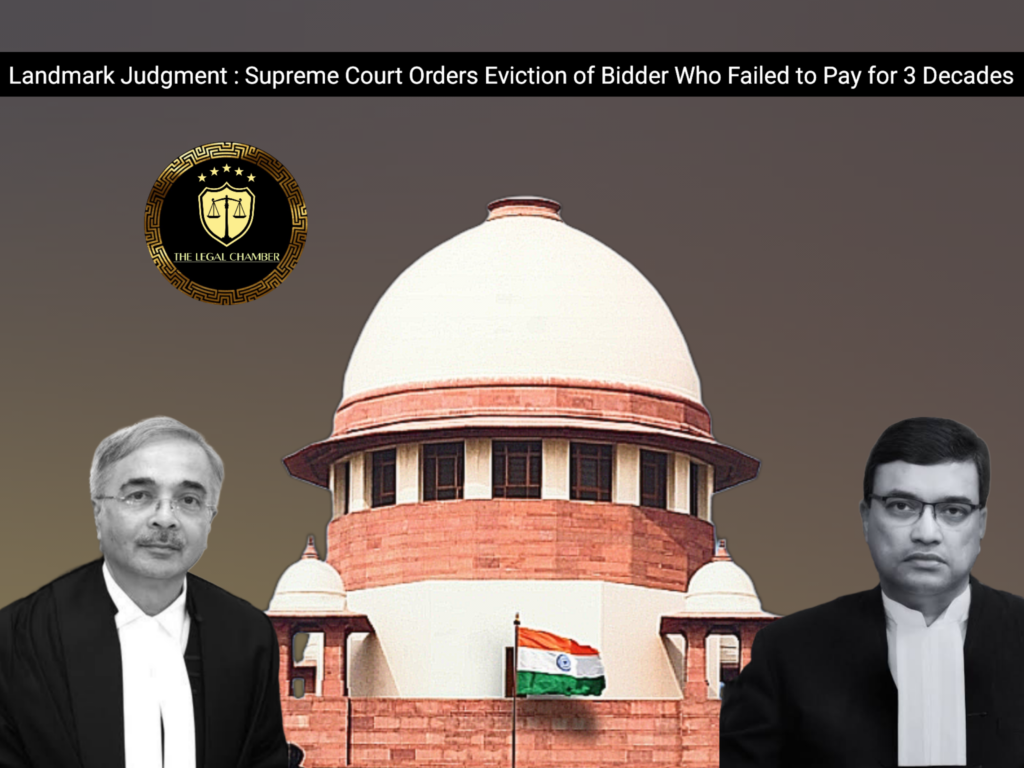
The Supreme Court upheld the Tamil Nadu Housing Board’s cancellation of allotment due to the respondent’s chronic default in payment over decades. The Court emphasized that public property must be managed transparently and in the public interest, rejecting the respondent’s claims. It ruled that prolonged non-payment justified eviction, denying further indulgence and ordering possession to be surrendered within four months. The judgment reinforced that contractual obligations must be honored and that courts cannot indefinitely protect defaulters at the cost of public welfare.
Facts Of The Case:
In 1986, the Tamil Nadu Housing Board auctioned a prime commercial plot in Chennai, with S. Ganesan emerging as the highest bidder at ₹4,78,921. Despite the Board’s acceptance of his bid, Ganesan failed to pay the initial 25% deposit, leading to cancellation in 1987. After repeated representations, the Board conditionally reinstated the allotment in 1993, requiring payment of arrears with interest and a revocation fee. Though Ganesan paid the initial deposit and fee, he defaulted on subsequent instalments under a hire-purchase scheme.In 1998, the Board erroneously informed him that only ₹77,300 was due, which he paid. Later, the Board corrected the amount to ₹15,26,023, but Ganesan failed to pay, resulting in cancellation in 2004. Despite multiple court interventions and opportunities to settle dues—including a High Court directive in 2025 to pay ₹3 crore—Ganesan defaulted again. The Supreme Court, noting his prolonged non-payment and lack of bona fides, upheld the Board’s right to cancel the allotment. It ordered Ganesan to vacate within four months, emphasizing that public property cannot be held indefinitely by a defaulter. The Court also permitted the Board to recover unpaid dues with interest and re-auction the plot, prioritizing public interest over individual claims.
Procedural History:
The case originated in 2004 when S. Ganesan challenged the Tamil Nadu Housing Board’s cancellation of his plot allotment through *Writ Petition No. 30373/2005* before the Madras High Court, which granted interim relief but ultimately saw withdrawal of the petition in 2010. Ganesan later filed *Writ Petition No. 5531/2012*, leading to a 2020 High Court order quashing the Board’s cancellation and remanding the matter for reconsideration. When the Board reaffirmed the cancellation, Ganesan filed *Writ Petition No. 16149/2020*, which was dismissed in 2021, directing refund of his payments and permitting re-auction. He then appealed (*Writ Appeal No. 1347/2022*), and in 2025, a Division Bench overturned the Single Judge’s order, allowing him to pay ₹3 crore in instalments for the plot. The Board appealed to the Supreme Court (*Civil Appeal No. 9631/2025*), which reversed the High Court’s decision, upholding the cancellation due to Ganesan’s chronic defaults and ordering eviction within four months. The Court emphasized finality in litigation and the need to safeguard public interest in property disputes.
READ ALSO : Supreme Court Slams Bail Order: Shelter Home Superintendent Must Surrender in Sex Exploitation Case
Court Observation:
The Supreme Court made several critical observations in its judgment. It strongly criticized the respondent’s conduct, noting his “chronic defaults” and “lackadaisical attitude” spanning nearly four decades. The Court observed that the respondent had consistently failed to honor his financial obligations despite multiple opportunities granted by both the Housing Board and judicial forums. Significantly, the Bench emphasized that public property must be managed with transparency and in the public interest, stating that the Board as custodian was right to prioritize broader welfare over individual claims. The judgment noted with disapproval how the respondent had taken advantage of administrative errors (like the 1998 miscalculation) while being fully aware of his outstanding liabilities. The Court also rejected the High Court’s leniency, observing that allowing further concessions would set a dangerous precedent where defaulters could indefinitely retain possession of public assets. Importantly, the Bench highlighted how such prolonged litigation causes substantial loss to the public exchequer due to inflationary property values, ultimately ruling that judicial indulgence cannot perpetually protect parties who disregard their contractual and legal obligations.
Final Decision & Judgement:
The Supreme Court allowed the appeal filed by the Tamil Nadu Housing Board, setting aside the Division Bench’s order that had granted the respondent further time to pay the outstanding amount. The Court conclusively terminated the respondent’s rights over the disputed plot, directing him to vacate the property within four months, failing which the Board would be entitled to take possession with police assistance. Significantly, the judgment authorized the Board to recover the balance sale consideration of ₹2,81,890 along with 6% simple interest from the date of possession as arrears of land revenue. The Court further permitted the Board to re-auction the property in public interest, emphasizing that three decades of litigation had caused sufficient prejudice to public welfare. The Bench imposed no costs but made it clear that no further legal recourse would be available to the respondent, bringing finality to the four-decade-old dispute while reinforcing the principle that public resources cannot be indefinitely appropriated through default and litigation.
Download The Judgement Here